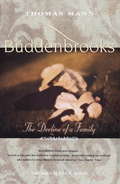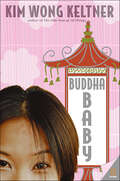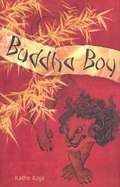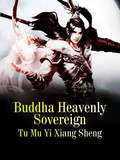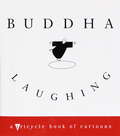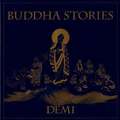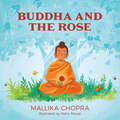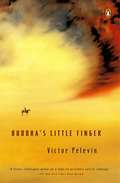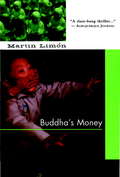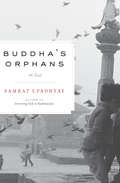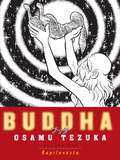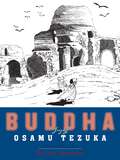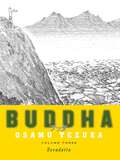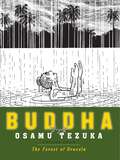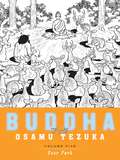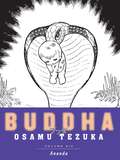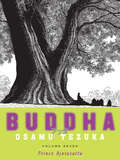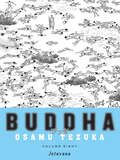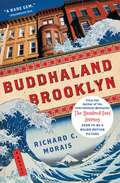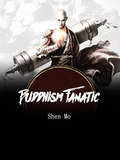- Table View
- List View
Buddenbrooks: The Decline of a Family (Vintage International)
by Thomas MannA Major Literary Event: a brilliant new translation of Thomas Mann's first great novel, one of the two for which he was awarded the Nobel Prize in literature in 1929.Buddenbrooks, first published in Germany in 1900, when Mann was only twenty-five, has become a classic of modem literature -- the story of four generations of a wealthy bourgeois family in northern Germany. With consummate skill, Mann draws a rounded picture of middle-class life: births and christenings; marriages, divorces, and deaths; successes and failures. These commonplace occurrences, intrinsically the same, vary slightly as they recur in each succeeding generation. Yet as the Buddenbrooks family eventually succumbs to the seductions of modernity -- seductions that are at variance with its own traditions -- its downfall becomes certain.In immensity of scope, richness of detail, and fullness of humanity, Buddenbrooks surpasses all other modem family chronicles; it has, indeed, proved a model for most of them. Judged as the greatest of Mann's novels by some critics, it is ranked as among the greatest by all. Thomas Mann was awarded the Nobel Prize for literature in 1929.From the Hardcover edition.
Buddha Baby
by Kim Wong KeltnerWant to learn a thing or two about a young Chinese-Americanwoman with a penchant for Hello Kitty toys, who could be found squeezing into jeans at Old Navy while being asked for detailed explanations of Yo-Yo Ma's success?Then get ready for:WHOLindsey Owyang, raised on Spaghetti-O'sand Aaron Spelling productionsWHATHer Secret Asian Man finally proposes!WHERESpringtime in San Francisco and it's raining stone cold foxesHOWLindsey wants to make her peace with Chinatown & country,but will a crotchety Chinese grandmother stand in her way?WHYBecause she never expected her hottie crush fromsixth grade to show up now ...As Lindsey continues her quest for identity, family secrets, and true love, will she find double happiness, or will she be tempted by one last lion dance with a stranger? Ultimately, Lindsey realizes that Chinese girls really wanna have chow fun.
Buddha Boy
by Kathe KojaJustin spends time with Jinsen, the unusual and artistic new student whom the school bullies torment and call Buddha Boy, and ends up making choices that impact Jinsen, himself, and the entire school.
Buddha Heavenly Sovereign: Volume 1 (Volume 1 #1)
by Tu MuyixiangshengIn his previous life he had fused his Primordial Spirit and mastered the Grand Dao of Immortality Whoever wanted to block his way would have no mercy
Buddha Heavenly Sovereign: Volume 2 (Volume 2 #2)
by Tu MuyixiangshengIn his previous life he had fused his Primordial Spirit and mastered the Grand Dao of Immortality Whoever wanted to block his way would have no mercy
Buddha Laughing
by Tricycle MagazineThese eighty-five cartoons provide a hilarious perspective on everything from reincarnation to mindful--or perhaps mindless--ness. Over the centuries, Buddhism has offered the world a clear-eyed, down-to-earth approach to life and death. This irresistible little book of teachings is no exception. It demonstrates that wisdom can--and often should--be taught through humor. Buddha Laughingis a healthy recipe for lightening up, the path to true enlightenment.
Buddha Stories
by DemiA compilation of 10 classic fables based on Buddha's work that encourages children to think about the good virtues and values in life.
Buddha and the Rose
by Mallika ChopraA Junior Library Guild selection! A gorgeously illustrated picture book about the myth of the Buddha and a simple rose told by wellness and mindfulness expert Mallika Chopra. Buddha sat, gazing at the flower in his hand, a smile on his face. Sujata, the milkmaid, approached Buddha with some rice puddling to break his long fast. As she gazed at the Buddha and then at the rose, she closed her eyes, took a deep breath, opened her eyes, and what she saw and felt changed her life forever. A subtle, powerful, and calming story about our connection with the natural world and the universe that connects all of us. Wellness expert and author Mallika Chopra and illustrator Neha Rawat breathe life into this simple but poignant story of awareness, wonder, and the joy of being present and open to seeing the world in new ways.
Buddha's Little Finger
by Victor PelevinThe Russian author Victor Pelevin is rapidly establishing a reputation as one of the most brilliant young writers at work today. His comic inventiveness and talent as a pure fabulist have won him comparisons to Kafka, Calvino, Bulgakov, Gogol, Phillip K. Dick, and Joseph Heller, and Time magazine has described him as a "psychedelic Nabokov for the cyberage. " In Pelevin's new novel, Buddha's Little Finger, Pyotr Void, a leading St. Petersburg poet, unexpectedly finds himself in the midst of the 1919 civil war in Russia, serving as commissar to the legendary Bolshevik commander Vasily Ivanovich Chapaev and his formidable machine-gunner sidekick, Anna. But what is the secret of her machine gun? Why does Pyotr keep waking to find himself in a psychiatric hospital in Moscow in the 1990s? And where does Arnold Schwarzenegger fit into all this? Shifting between time and place and spinning story upon story, Buddha's Little Finger is unlike any other novel, a work of demonic absurdism that demonstrates Pelevin's genius for metaphysical comedy.
Buddha's Money (George Sueño and Ernie Bascom #3)
by Martin Limón"Fast and confident . . . well-drawn and vivid."--The Seattle Times "A slam-bang thriller. . . . Limón keeps the action coming at a furious pace."--Albuquerque Journal "The locations . . . are as amazingly vivid as ever, and his wild men heroes are just as good company."--Los Angeles Times George and Ernie are American military cops in Korea. They work the neon alleys of sin districts, chasing felons and black marketeers. It's not glamorous, but somebody's got to do it. The kidnapping of a child, held ransom for a priceless jade artifact, is more than these seedy cops can handle. They urge the father to pay it. The only problem is, dad hasn't got it. From that point on, officers Sueño and Bascom are pushed into intrigues way over their heads and expected to unravel conspiracies that are beyond them. Can two disheveled, disrespectful army foul-ups cope with all this? Then again, it's not like they have a choice. Martin Limón retired from US military service after 20 years in the US Army, including a total of 10 years in Korea. He and his wife live in Seattle. He is the author of Jade Lady Burning, which was a New York Times Notable Book, and Slicky Boys.
Buddha's Orphans: A Novel
by Samrat UpadhyayCalled "a Buddhist Chekhov" by the San Francisco Chronicle, Samrat Upadhyay's writing has been praised by Amitav Ghosh and Suketu Mehta, and compared with the work of Akhil Sharma and Jhumpa Lahiri. Upadhyay's new novel, Buddha's Orphans, uses Nepal's political upheavals of the past century as a backdrop to the story of an orphan boy, Raja, and the girl he is fated to love, Nilu, a daughter of privilege.Their love story scandalizes both families and takes readers through time and across the globe, through the loss of and search for children, and through several generations, hinting that perhaps old bends can, in fact, be righted in future branches of a family tree. Buddha's Orphans is a novel permeated with the sense of how we are irreparably connected to the mothers who birthed us and of the way events of the past, even those we are ignorant of, inevitably haunt the present. But most of all it is an engrossing, unconventional love story and a seductiveand transporting read.
Buddha, Volume 1: Kapilavastu (Buddha #1)
by Osamu TezukaOsamu Tezuka's vaunted storytelling genius, consummate skill at visual expression, and warm humanity blossom fully in his eight-volume epic of Siddhartha's life and times. Tezuka evidences his profound grasp of the subject by contextualizing the Buddha's ideas; the emphasis is on movement, action, emotion, and conflict as the prince Siddhartha runs away from home, travels across India, and questions Hindu practices such as ascetic self-mutilation and caste oppression. Rather than recommend resignation and impassivity, Tezuka's Buddha predicates enlightenment upon recognizing the interconnectedness of life, having compassion for the suffering, and ordering one's life sensibly. Philosophical segments are threaded into interpersonal situations with ground-breaking visual dynamism by an artist who makes sure never to lose his readers' attention. Tezuka himself was a humanist rather than a Buddhist, and his magnum opus is not an attempt at propaganda. Hermann Hesse's novel or Bertolucci's film is comparable in this regard; in fact, Tezuka's approach is slightly irreverent in that it incorporates something that Western commentators often eschew, namely, humor.
Buddha, Volume 2: The Four Encounters (Buddha #2)
by Osamu TezukaOsamu Tezuka's vaunted storytelling genius, consummate skill at visual expression, and warm humanity blossom fully in his eight-volume epic of Siddhartha's life and times. Tezuka evidences his profound grasp of the subject by contextualizing the Buddha's ideas; the emphasis is on movement, action, emotion, and conflict as the prince Siddhartha runs away from home, travels across India, and questions Hindu practices such as ascetic self-mutilation and caste oppression. Rather than recommend resignation and impassivity, Tezuka's Buddha predicates enlightenment upon recognizing the interconnectedness of life, having compassion for the suffering, and ordering one's life sensibly. Philosophical segments are threaded into interpersonal situations with ground-breaking visual dynamism by an artist who makes sure never to lose his readers' attention. Tezuka himself was a humanist rather than a Buddhist, and his magnum opus is not an attempt at propaganda. Hermann Hesse's novel or Bertolucci's film is comparable in this regard; in fact, Tezuka's approach is slightly irreverent in that it incorporates something that Western commentators often eschew, namely, humor.
Buddha: Volume 3: Devadatta (Buddha #3)
by Osamu TezukaThe Eisner and Harvey Winner The third volume of this epic graphic novel send Siddhartha further into a world mired in pain and suffering. The journey to peace and enlightenment looms far but bright. Prince Siddhartha quickly learns that the monk's path is covered in thorns and self-abuses much more profound than shaving your head. His new companions Dhepa and Assaji accompany him to plague-ridden town, ruled by the ravishing Visakha. On a different path filled with as many vagaries is Devadatta, an orphan who learns only that bad almost always gets worse. To strange cities, and dire prophecies...
Buddha: Volume 4: The Forest of Uruvela (Buddha #4)
by Osamu TezukaThe Eisner and Harvey Winner In this fourth volume of the award-winning graphic novel biography, Buddha slowly discovers that his destiny lies in a path not readily available to him. With fellow ascetics Dhepa who has complete faith in the purifying quality of painful physical ordeals, and Assaji, who can predict everyone's death to the hour, Buddha travels through the kingdom of Magadha into the Forest of Uruvela, where The Middle Path and Enlightenment wait beyond a series of death-defying trials. Awake under the Pippala tree...
Buddha: Volume 5: Deer Park (Buddha #5)
by Osamu TezukaIn the fifth installment of manga-godfather Osamu Tezuka's Buddha, engagement with death imparts the lesson of life's sanctity. In a Machiavellian rise to power, Devadatta, a rogue aristocrat, incites war between two kingdoms that will leave thousands dead. King Bimisara of Magadha, fearing death his son's own hand, withdraws fatherly love. The true measure of the Buddha's divinity will turn out to be a test of diplomacy - the power of words.
Buddha: Volume 6: Ananda (Buddha #6)
by Osamu TezukaIn the sixth volume of manga visionary Osamu Tezuka's Buddha, the devil Mara possesses the bandit Ananda, half-brother of Devadatta, in an effort to eliminate the Buddha. A ruthless killer who is impervious to physical harm, Ananda will retain the devil's favor only if he spurns his love interest. When Ananda and his bandit buddy attack the Fire Shrine of the Brahmin brothers Kassapa, it is none other than the Awakened One who happens by. Buddha must confront his eternal enemy, Mara, before he can open the eyes of arrogant priests and hardened criminals.
Buddha: Volume 7: Prince Ajatasattu (Buddha #7)
by Osamu TezukaOsamu Tezuka's vaunted storytelling genius, consummate skill at visual expression, and warm humanity blossom fully in his eight-volume epic of Siddhartha's life and times. Tezuka evidences his profound grasp of the subject by contextualizing the Buddha's ideas; the emphasis is on movement, action, emotion, and conflict as the prince Siddhartha runs away from home, travels across India, and questions Hindu practices such as ascetic self-mutilation and caste oppression. Rather than recommend resignation and impassivity, Tezuka's Buddha predicates enlightenment upon recognizing the interconnectedness of life, having compassion for the suffering, and ordering one's life sensibly. Philosophical segments are threaded into interpersonal situations with ground-breaking visual dynamism by an artist who makes sure never to lose his readers' attention. Tezuka himself was a humanist rather than a Buddhist, and his magnum opus is not an attempt at propaganda. Hermann Hesse's novel or Bertolucci's film is comparable in this regard; in fact, Tezuka's approach is slightly irreverent in that it incorporates something that Western commentators often eschew, namely, humor.
Buddha: Volume 8: Jetavana (Buddha #8)
by Osamu TezukaOsamu Tezuka's vaunted storytelling genius, consummate skill at visual expression, and warm humanity blossom fully in his eight-volume epic of Siddhartha's life and times. Tezuka evidences his profound grasp of the subject by contextualizing the Buddha's ideas; the emphasis is on movement, action, emotion, and conflict as the prince Siddhartha runs away from home, travels across India, and questions Hindu practices such as ascetic self-mutilation and caste oppression. Rather than recommend resignation and impassivity, Tezuka's Buddha predicates enlightenment upon recognizing the interconnectedness of life, having compassion for the suffering, and ordering one's life sensibly. Philosophical segments are threaded into interpersonal situations with ground-breaking visual dynamism by an artist who makes sure never to lose his readers' attention. Tezuka himself was a humanist rather than a Buddhist, and his magnum opus is not an attempt at propaganda. Hermann Hesse's novel or Bertolucci's film is comparable in this regard; in fact, Tezuka's approach is slightly irreverent in that it incorporates something that Western commentators often eschew, namely, humor.
Buddhaland Brooklyn
by Richard C Morais"The life of a man is like a ball in the river-- no matter what our will wants or desires, we are swept along by an invisible current that finally delivers us to the limitless expanse of the black sea." So reflects the elderly Buddhist priest Seido Oda as he considers the life that brought him from an idyllic mountainside village in Japan to the bustling streets of Brooklyn, New York-- a touching and humorous journey richly depicted in Buddhaland Brooklyn. Oda's boyhood is spent fishing in clear mountain streams, picking plums, and helping his parents run the family's village inn on the slopes of Mount Nagata. But at age eleven, his parents hand him over to the monks at the nearby Buddhist monastery. Separated from his family and deeply lonely, the acolyte adjusts to monastic life by devoting himself to painting, poetry, and prayer--and avoiding human contact. This safe and quiet existence is unexpectedly upended, however, when he reaches middle age and is ordered by his superior to open a temple in Brooklyn. New York is a shock to the introverted Oda. A shy, socially inept Japanese priest who hides his true feelings behind a severe manner, Reverend Oda must spiritually lead the ragtag army of eccentric New Yorkers who make up the local Buddhist community. This motley crew and their misguided practices provide for a host of hilarious cultural misunderstandings and mishaps. But when tragedy strikes, Oda's rigid worldview is shattered and his eyes are finally opened to the long-buried sadness and personal shortcomings in his own life. It is only when he comes to appreciate the Americans, flaws and all, that Oda finds in Brooklyn the home he has always sought. A lively, vivid novel, Buddhaland Brooklyn stirs from the very first page. This is an entertaining and edifying meditation on the meaning and rewards of true acceptance.
Buddhi Prerana Va Kranti Bhag 2: बुद्धी, प्रेरणा व क्रांती भाग २
by B. R. Sunthankarश्री. मानवेंद्रनाथ रॉय यांच्या “Reason, Romanticism + Revolution” या विचारप्रवर्तक ग्रंथाचा मराठी अनुवाद बा. रं. सुंठणकर यांनी केला आहे, तसेच साहित्य संस्कृती मंडळातर्फे तो प्रकाशित केला गेला आहे. बुद्धी, प्रेरणा व क्रांती भाग २ ग्रंथाचा हा दुसरा खंड आहे. श्री. रॉय हे अस्सल बुद्धिवादी आणि पूर्ण जडवादी होते. त्या भूमिकेवरूनच त्यांनी आपले “नवमानवतावादा”चे तत्त्वज्ञान मांडले. या ग्रंथात त्यांची तत्त्वप्रणाली संक्षेपाने ग्रंथित झाली आहे. या प्रथम खंडात प्रारंभी इतिहासाच्या तत्त्वज्ञानाचा दृष्टिकोन विशद करून त्यांनी आधुनिक युरोपीय संस्कृती आणि तिच्यातील विविध तत्त्वप्रणाली यांचे साक्षेपी पर्यालोचन केले आहे. मानवी स्वभावाचे शास्त्रीय दृष्टिकोनातून पृथक्करण करून नियमबद्ध विश्वकल्पनेच्या पार्श्वभूमीवर युरोपातील विविध विचारप्रवाहांचा विकास कसा झाला याचे दिग्दर्शन केले आहे. रेनेसान्स, धर्मसुधारणा, आधुनिक तत्त्वज्ञानाचा उदय, प्रबोधन, फ्रेंच राज्यक्रांती, या अर्वाचीन युरोपच्या इतिहासातील प्रमुख घटनांचे वस्तुनिष्ठ आणि चिकित्सक दृष्टीतून समीक्षण करण्यात आले आहे. विचारांचे स्वतःचे असे स्वतंत्र गतिशास्त्र आणि तर्कशास्त्र असते, हा रॉय यांचा सिद्धान्त विविध विचारसरणीच्या संदर्भात या ग्रंथात विस्ताराने दिग्दर्शित करण्यात आला आहे. हे या ग्रंथाचे वैशिष्ट्य आहे.
Buddhism Fanatic: Volume 4 (Volume 4 #4)
by Shen MoThe Ancestral Buddha prophesied: Eighty-four thousand years later, when the Buddhist Mantra dissipated and the Taoism was cut off, the Buddhist disciple Lu Yang was reborn with the "Devil Subduing Heaven Book". With his Diamond Body, he started cultivating his demonic powers internally, and from then on, he embarked on a path of cultivation that defied the heavens. He pointed to the sky with his left hand and the earth with his right — he was the supreme being in all the heavens and the earth!
Buddhism Fanatic: Volume 5 (Volume 5 #5)
by Shen MoThe Ancestral Buddha prophesied: Eighty-four thousand years later, when the Buddhist Mantra dissipated and the Taoism was cut off, the Buddhist disciple Lu Yang was reborn with the "Devil Subduing Heaven Book". With his Diamond Body, he started cultivating his demonic powers internally, and from then on, he embarked on a path of cultivation that defied the heavens. He pointed to the sky with his left hand and the earth with his right — he was the supreme being in all the heavens and the earth!
Buddhism Fanatic: Volume 6 (Volume 6 #6)
by Shen MoThe Ancestral Buddha prophesied: Eighty-four thousand years later, when the Buddhist Mantra dissipated and the Taoism was cut off, the Buddhist disciple Lu Yang was reborn with the "Devil Subduing Heaven Book". With his Diamond Body, he started cultivating his demonic powers internally, and from then on, he embarked on a path of cultivation that defied the heavens. He pointed to the sky with his left hand and the earth with his right — he was the supreme being in all the heavens and the earth!
Buddhism Fanatic: Volume 7 (Volume 7 #7)
by Shen MoThe Ancestral Buddha prophesied: Eighty-four thousand years later, when the Buddhist Mantra dissipated and the Taoism was cut off, the Buddhist disciple Lu Yang was reborn with the "Devil Subduing Heaven Book". With his Diamond Body, he started cultivating his demonic powers internally, and from then on, he embarked on a path of cultivation that defied the heavens. He pointed to the sky with his left hand and the earth with his right — he was the supreme being in all the heavens and the earth!
